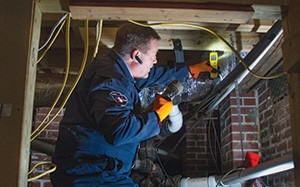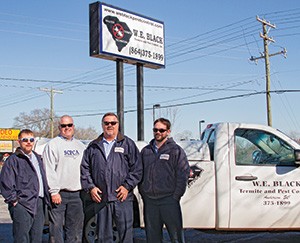
Billy Black uses a moisture meter as an additional termite inspection tool.
Photo: Van Sullivan Photography
One of the best things Billy Black ever did, he contends, was leave Anderson, S.C. Another one of the best things he ever did? He returned to Anderson, S.C. Today he runs W.E. Black Termite & Pest Control with four termite technicians, five general pest technicians, four office staffers and an 8,000-sq.-ft. headquarters. (We’d be remiss if we didn’t point out that he also met and married his wife, with whom he has two sons, in Anderson.)
Like South Carolina, pest control has been in Black’s blood his whole life. His father, the late Bill Sr., worked as a tech for a national company in the mid-1960s until he decided he could do it better himself. From 1968 until Bill Sr. sold the company in 1988, Inter-state Termite & Pest Control Inc. was a family affair — with his wife as bookkeeper and young Billy by his side learning the trade on weekends and after school.
The oldest of the four Black children, Billy is the only one in the pest management business. And even then, there was a period when he thought it wasn’t for him.
“I left Anderson and worked my way up in fitness club management,” he says. “In the early 1990s, that industry consolidated and changed a great deal. I left it to work at AT&T in their small-business department for a couple years, and then Dad said, ‘Why not open a pest control business?’”
With his background in customer service and fond memories of being a young technician, Black agreed. His father helped him reactivate his license, which was originally issued in 1978 after high school. His mother helped with the books, and by August 1993, Black’s business was up and running — out of a spare bedroom in his home.
It wouldn’t be a house-based business for long, however. Black contends that was due, in part, to his father’s reputation around town.

From left are Jason Brown, general manager; Sean Courneen, pest/termite technician; Billy Black, and T.J. Cason, senior termite technician.
Photo: Van Sullivan Photography
“One day Dad said to me, ‘Do you realize some people see your company name and think it’s me getting back in business?’” he recalls. “I said, ‘Not only do I know that, it’s why I did it.’”
Back in Black
Black wasn’t trading on his father’s good name alone, however. “I lost a lot of business by not compromising my standards,” he recalls. “I would sit and wonder, ‘Should I have cut my prices just to get the account?’ But I knew that once you do it, you have to continue to do it.”
Black needn’t have worried. Customers wanting quality service soon began to notice him.
“A Realtor who had worked with Dad years before saw I was in business, and figured I was hungry for any job I could get,” he says. “He asked me to look at a house with moisture problems, and I told him it was going to be $175 to treat.
“‘Gee, that’s awfully high, can’t you come down a bit?’ he asked me,” Black continues. “I said, ‘Look, I have a code to meet. I have to clean the debris, especially because you have guys painting and nailing all over the house.’ He said he needed someone to stand behind the work, and I told him, ‘I will. That’s where the $175 comes in.’ He shook my hand and from that point on, he gave me a lot of business.”
W.E. Black’s business is 85 percent residential and 15 percent commercial. On the termite side, pretreats comprise only about 10 percent of business because Black’s experience too often has been with builders looking at price over quality. The few builders with whom he does work meet high industry standards, Black adds.
Everyone’s in sales
Black says he believes that regardless of the industry, every employee is a salesperson at some level.
“The other companies drive the same trucks and use the same tools, but it’s the people who make the difference,” he adds. “It’s about having a good relationship with customers, regulation inspectors and distributors. We all have to work hand in hand.”
Black runs his company the way his father did.
“Be honest and take care of people, but still make a profit,” he says. “Dad’s contracts were simple and open-ended. I’ve taken the same basic contract and expanded it to reflect updated regulations and codes. It takes care of not only the customer, but the business, too.”
Price also comes into play in an unusual way for W.E. Black. If there’s a company-wide increase in service price, it only affects new customers.
“People have told me I’m leaving money on the table, but over the years, these customers have carried me,” Black says, noting that as older customers move out of the area, new customers tend to take their place.
Other business lessons Black has learned throughout his decades in pest management include:
⦁ Today’s customers are more educated than ever. Maybe it’s the Internet, maybe it’s prior experience with termite infestation, maybe it’s secondhand info from a friend or family member, but regardless the source, Black’s technicians are often inundated with questions and comments by customers following them around on the job — and he doesn’t mind one bit.
“A properly educated customer is our best customer,” he says, noting his technicians receive training to help ensure the information their customers receive is correct.
⦁ Word of mouth is the best advertising. “It keeps you going like nothing else,” Black says. In fact, his goal with a recent billboard campaign wasn’t to attract new customers as much as it was to get existing customers to see the sign and have a casual conversation — and recommendation — with friends and neighbors.
⦁ Unhappy customers don’t always talk … to you. “How many times have you been out to eat and you don’t get a drink refill? You’re waiting on the check 10 minutes? Maybe you’ll give the restaurant another chance, but you’re not going to go out of your way to recommend it to anyone,” he says, noting the parallel to pest management service. “If you’re not taking care of Mrs. Jones, she’s not going to tell Mr. Smith to call us.”
⦁ Don’t waste time on no-budget customers. “As far as I know, we are the only company that lists our service prices right on our website,” Black says. “It weeds out folks who are looking only for the cheapest price. They can go with the cheapest, and once that doesn’t work, then they’ll call us.”
Technical training
When Bill Sr. was doing pest control in the 1970s and 1980s, he trained someone until he felt the tech knew what needed to be done. Today, South Carolina technicians have to complete verifiable training before they’re allowed to be alone in a company vehicle. W.E. Black goes a step further, ensuring each new technician has ridden with every other technician at least once.
“The training period takes about six to 12 weeks,” Black says.
His other then-vs.-now observations include:
⦁ The spacings, they are a’shrinkin’. In the 1970s, a termite tech drilled his termiticide holes 36 in. apart. When Black started his company in 1993, the label required 24 in. spacing. Today, it’s 12 in. apart. “I’m waiting for the labels to say 6 in.,” he says with a chuckle.
⦁ Technology’s great, but you still have to crawl under the house. “There’s no substitute for a human inspection,” he says. “The termite-trained dogs might be able to sniff out a problem, but they can’t give you specs about the house and recommend the right strategy.”
⦁ On the other hand, technology’s great. Black is pleased with many innovations in termite control, and he’s particularly grateful for the availability and accuracy of moisture meters: “When Dad was in business, he had to eyeball it — ‘This is my opinion, based on experience.’ Today, we can back it up with data.”
Black’s not sure whether his two sons will go beyond their high school and college summers in the pest control business. He’s not pressuring them. He had to find his way back to it on his own. If it’s meant to be, he says, they will, too.
“I love this industry,” Black concludes. “Just like any industry, there are a few bad apples. But the good, honest and strong survive.”
My, how times have changed
While Billy Black is old enough to recall treating termite accounts with chlordane, he’s glad to be in the industry at a time when safe, yet effective, treatment options are available.
“When I was in high school, we used to do dirt-filled porches, using a sledgehammer and chisel to knock out brick and then dig out the dirt with a small shovel,” Black says. “You’d then flood it with termiticide. Today, we have high-powered rotary hammer drills that make our jobs a lot easier.”
The memories came “flooding” back recently when one of Black’s technicians went on a wood-destroying organism house inspection (known as a CL-100 in South Carolina) for a real-estate deal, but then the deal fell through. By the time the next buyer was ready for an inspection, the CL-100 had expired. Black’s original technician was away, so he decided to do the inspection himself.
“It was an older house,” he says. “I looked over the form and saw we had checked the block and there was ‘No visible evidence of prior treatment.’”
But then, Black encountered three dirt-filled porches. Upon closer inspection, he saw evidence that areas had been voided.
“I had to change the letter to say there had been visible evidence of prior treatment,” he says.
Black called the state regulatory department to find out whether his technician was in the wrong. Having only been on the job five years, should the tech be expected to recognize a treatment from 40 years ago? The official response was no, it was an understandable oversight.
Still, it led to Black training his team about what a previously voided area looks like.
“The liability is kind of scary,” he says. “Think about people who open termite companies coming from the construction and landscaping fields, and the things they don’t know about termite treatment.
“That old saying about how it’s better to beg forgiveness than to ask permission doesn’t wash with termite control,” Black continues. “You’d better ask for permission regardless. I always look at what the worst-case scenario is, and work my way back from there. That way, you usually don’t have any problems, and there’s no need for forgiveness.”
You can reach Heather Gooch at hgooch@northcoastmedia.net or 330-321-9754.
Leave A Comment